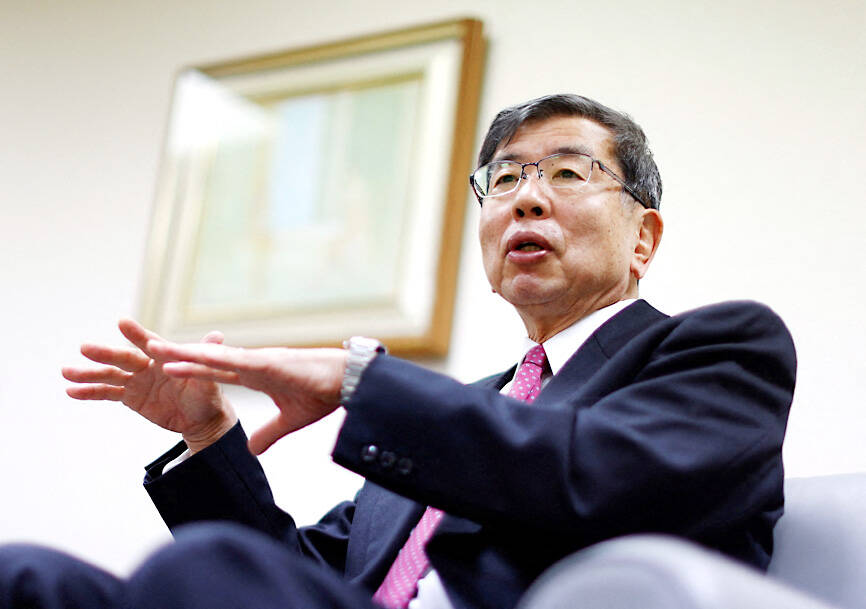Taiwan should seek to maintain its importance in regional geopolitical stability and adopt policy measures on immigration, pensionable age and low fertility to ensure its labor supply, visiting Japanese economic and financial academic Takehiko Nakao told local trade group the Third Wednesday Club yesterday.
Nakao is a former Asian Development Bank (ADB) president and chairs the Institute at Mizuho Research and Technologies.
He said Taiwan is an essential part of the global value chain with sophisticated semiconductor production, which is why it has been invited to invest in Japan, the US and other countries.

Photo: Reuters
Taiwan also has unique, deep and broad economic ties with China and Hong Kong through trade, investment and technologies, and has very sound fiscal and monetary policies and well-educated human resources, especially in the information technology sector, he said.
However, Taiwan needs to diversify its industrial sector away from semiconductors and reinforce entrepreneurship and innovation, Nakao said.
To maintain sustainable growth, Taiwan must also to address its aging population, as it has a birthrate of 0.87 per woman, lower than 1.26 in Japan and 1.09 in China, he said, adding that 2.1 births are considered necessary to maintain a stable population.
Low birthrates weigh on GDP showings, an unfavorable phenomenon that is also plaguing Japan and China, he said.
The government could help by easing immigration rules, postponing the retirement age and providing incentives for having children, Nakao said.
While China is losing its demographic bonus, it could avoid Japan’s economic situation by reducing bad debt, enhancing open trade and investment regimes, creating a conducive and safe business environment for foreign and private companies, maintaining an entrepreneurial spirit and increasing investment in technology, Nakao said.
China also needs to avoid decoupling by collaborating with other countries, improving communication and building trust with the international community, he said.

The US dollar was trading at NT$29.7 at 10am today on the Taipei Foreign Exchange, as the New Taiwan dollar gained NT$1.364 from the previous close last week. The NT dollar continued to rise today, after surging 3.07 percent on Friday. After opening at NT$30.91, the NT dollar gained more than NT$1 in just 15 minutes, briefly passing the NT$30 mark. Before the US Department of the Treasury's semi-annual currency report came out, expectations that the NT dollar would keep rising were already building. The NT dollar on Friday closed at NT$31.064, up by NT$0.953 — a 3.07 percent single-day gain. Today,

‘SHORT TERM’: The local currency would likely remain strong in the near term, driven by anticipated US trade pressure, capital inflows and expectations of a US Fed rate cut The US dollar is expected to fall below NT$30 in the near term, as traders anticipate increased pressure from Washington for Taiwan to allow the New Taiwan dollar to appreciate, Cathay United Bank (國泰世華銀行) chief economist Lin Chi-chao (林啟超) said. Following a sharp drop in the greenback against the NT dollar on Friday, Lin told the Central News Agency that the local currency is likely to remain strong in the short term, driven in part by market psychology surrounding anticipated US policy pressure. On Friday, the US dollar fell NT$0.953, or 3.07 percent, closing at NT$31.064 — its lowest level since Jan.

Hong Kong authorities ramped up sales of the local dollar as the greenback’s slide threatened the foreign-exchange peg. The Hong Kong Monetary Authority (HKMA) sold a record HK$60.5 billion (US$7.8 billion) of the city’s currency, according to an alert sent on its Bloomberg page yesterday in Asia, after it tested the upper end of its trading band. That added to the HK$56.1 billion of sales versus the greenback since Friday. The rapid intervention signals efforts from the city’s authorities to limit the local currency’s moves within its HK$7.75 to HK$7.85 per US dollar trading band. Heavy sales of the local dollar by

The Financial Supervisory Commission (FSC) yesterday met with some of the nation’s largest insurance companies as a skyrocketing New Taiwan dollar piles pressure on their hundreds of billions of dollars in US bond investments. The commission has asked some life insurance firms, among the biggest Asian holders of US debt, to discuss how the rapidly strengthening NT dollar has impacted their operations, people familiar with the matter said. The meeting took place as the NT dollar jumped as much as 5 percent yesterday, its biggest intraday gain in more than three decades. The local currency surged as exporters rushed to